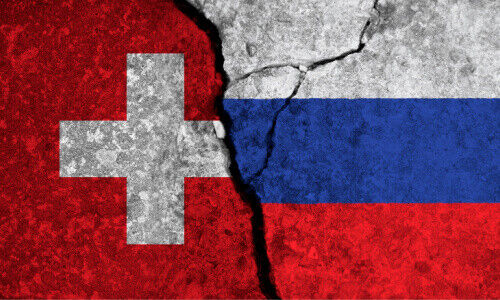Critics continue to fire away at Switzerland and the banking sector even though the country has fully adopted the sanctions regime against Russia. Is this fair?
The 28th of February 2022 is a very special day in recent Swiss history. Even though the country had imposed sanctions in the past, these followed the UN.
Russia's invasion of Ukraine changed all that. The government decided to fully adopt the EU's sanctions regime. The hope in Bern was that it would protect the country from accusations that it was benefiting from war. It was also something that had been shadowing Switzerland's policy of strict neutrality since the Second World War.
Two Industries
This vulnerability is still very relevant today and it mainly relates to two specific industries - the financial sector and precision machine tool manufacturing technology. The latter was deeply impacted by the wide-ranging sanctions against North Korea and Iran given that many of the goods are dual-use and can be used to make forbidden weapons systems.
Filters, sensors and machine tools and similar have always been coveted worldwide. And for some companies, figuring out what their eventual, potential use became a matter of survival. As they did not want to be caught flat out in any kind of sanctions breach.
Fatal Missteps
The financial sector played another role. The once strict interpretation of banking secrecy helped give the industry its doubtful reputation as a place to evade taxes at best and, at worst, to store assets belonging to criminals or despots.
That is now history after the various tax settlement agreements, in particular the one with the US, which involved billions in fines for Swiss finance. It would not be an exaggeration that the exact opposite holds today. Money that comes in under any kind of false premise today is a risk for Swiss banking. Many institutes deal with that in the knowledge that any misstep can prove fatal.
That made the banks provisionally block any assets held by Russian citizens in Switzerland at the time sanctions were announced. When the government reported progress in April, it disclosed that 3.4 billion francs (3.5 billion US dollars) had been released after the provisional block (the total number of blocked assets at the end of April was 6.3 billion francs). That all goes to show that bankers are fully aware of their responsibility.
Banking Russians
The sanctions have put a stop to an entire business. «Business with Russian clients isn't economical for most banks anymore, under the assumption that the business is conducted responsibly», says Veit Buetterlin (image below), a managing director and expert in sanctions questions at Alix Partners, a consultancy.

(Image: Alix Partners)
The basic equation still holds. The more risky the business is, the higher the compliance costs are. And that eats at a bank's margins.
Slipping Through
According to experts, banks are making large efforts to find sanctioned Russian assets. Their objective is to make sure that they are not liable for it later. The key problem for the industry is the cases that still manage to slip through. Fundamentally, the differences between money laundering and sanctions have to be kept in mind, even though both have similar processes and patterns.
According to Buetterlin, money laundering regulation is about monitoring and reporting while sanctions screening is about preventing payments through and to sanctioned individuals. That means that banks have to analyze each transaction against government lists and stop suspicious transfers. That usually happens with specialized software, with any hits investigated manually afterward.
«Russian Laundromat»
The search for illegal transactions poses a massive challenge for institutions. Mechanisms to evade sanctions are well known but hard to prevent, as they are for money laundering.
Many actors from the former Soviet Union have proven very adept when it comes to using banks, particularly in employing fake nominees and companies and finding malleable authorities. The «Russian Laundromat» affair that broke in 2010 showed a very targeted use of companies and legal authorities in CIS states to seemingly unconnected individuals in the west.
It is not important whether these assets were held in banks, real estate, company shares, art, cryptocurrencies, or even sports clubs. Finding the real beneficiary remains a massive challenge, Buetterlin maintains.
Crypto Exchange
Many have discussed the possibility of using cryptocurrencies and crypto-assets as a way of evading sanctions. Adrian Mom, who is also an expert at Alix Partners, is of the view that it is relatively easy to store assets in cryptocurrencies. And attempts have been seen related to the evasion of sanctions. But he does not think it will become significant.
Sanctioned individuals want to be able to exchange their crypto-assets into hard currency someday. But only a very few institutes will allow them to do that in the volume necessary as most do not have adequate quantities of fiat currency. Also, companies that can do that have become so established in the meantime that they have comparable money laundering and sanctions resources as banks.
Tired Accusations
But Switzerland is still suspected of helping individuals evade sanctions. In early May, the U.S. bipartisan Helsinki Committee, a U.S. raised the rhetoric a notch. The U.S. politicians accused Switzerland of being an enabler of «Russian dictator Vladimir Putin and his cronies». That shows what the country can expect in the future and that adopting sanctions will not change much.
But it could also be that the billions held by sanctioned oligarchs are now in Switzerland but in someplace like the Middle East.
It is much easier for Russian citizens to fly to the Gulf than it is to Western Europe given that most direct flights have been banned indefinitely. And the sheikdoms will have something to say should serious embargos be placed on oil and natural gas from Russia. That gives them leverage against the west that Switzerland simply doesn't have.




































